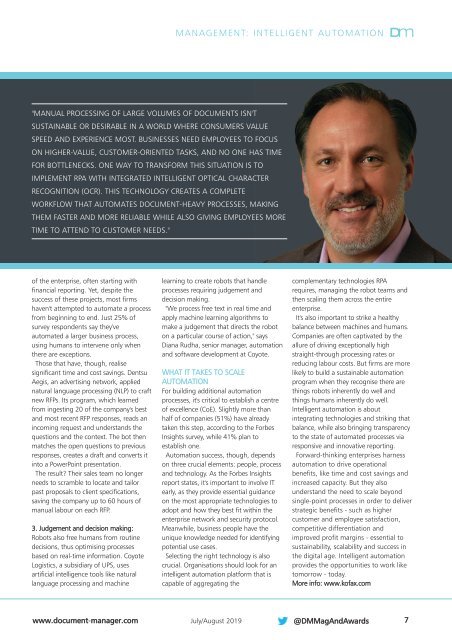DM1907
You also want an ePaper? Increase the reach of your titles
YUMPU automatically turns print PDFs into web optimized ePapers that Google loves.
MANAGEMENT: INTELLIGENT AUTOMATION Dm<br />
"MANUAL PROCESSING OF LARGE VOLUMES OF DOCUMENTS ISN'T<br />
SUSTAINABLE OR DESIRABLE IN A WORLD WHERE CONSUMERS VALUE<br />
SPEED AND EXPERIENCE MOST. BUSINESSES NEED EMPLOYEES TO FOCUS<br />
ON HIGHER-VALUE, CUSTOMER-ORIENTED TASKS, AND NO ONE HAS TIME<br />
FOR BOTTLENECKS. ONE WAY TO TRANSFORM THIS SITUATION IS TO<br />
IMPLEMENT RPA WITH INTEGRATED INTELLIGENT OPTICAL CHARACTER<br />
RECOGNITION (OCR). THIS TECHNOLOGY CREATES A COMPLETE<br />
WORKFLOW THAT AUTOMATES DOCUMENT-HEAVY PROCESSES, MAKING<br />
THEM FASTER AND MORE RELIABLE WHILE ALSO GIVING EMPLOYEES MORE<br />
TIME TO ATTEND TO CUSTOMER NEEDS."<br />
of the enterprise, often starting with<br />
financial reporting. Yet, despite the<br />
success of these projects, most firms<br />
haven't attempted to automate a process<br />
from beginning to end. Just 25% of<br />
survey respondents say they've<br />
automated a larger business process,<br />
using humans to intervene only when<br />
there are exceptions.<br />
Those that have, though, realise<br />
significant time and cost savings. Dentsu<br />
Aegis, an advertising network, applied<br />
natural language processing (NLP) to craft<br />
new RFPs. Its program, which learned<br />
from ingesting 20 of the company's best<br />
and most recent RFP responses, reads an<br />
incoming request and understands the<br />
questions and the context. The bot then<br />
matches the open questions to previous<br />
responses, creates a draft and converts it<br />
into a PowerPoint presentation.<br />
The result? Their sales team no longer<br />
needs to scramble to locate and tailor<br />
past proposals to client specifications,<br />
saving the company up to 60 hours of<br />
manual labour on each RFP.<br />
3. Judgement and decision making:<br />
Robots also free humans from routine<br />
decisions, thus optimising processes<br />
based on real-time information. Coyote<br />
Logistics, a subsidiary of UPS, uses<br />
artificial intelligence tools like natural<br />
language processing and machine<br />
learning to create robots that handle<br />
processes requiring judgement and<br />
decision making.<br />
"We process free text in real time and<br />
apply machine learning algorithms to<br />
make a judgement that directs the robot<br />
on a particular course of action," says<br />
Diana Rudha, senior manager, automation<br />
and software development at Coyote.<br />
WHAT IT TAKES TO SCALE<br />
AUTOMATION<br />
For building additional automation<br />
processes, it's critical to establish a centre<br />
of excellence (CoE). Slightly more than<br />
half of companies (51%) have already<br />
taken this step, according to the Forbes<br />
Insights survey, while 41% plan to<br />
establish one.<br />
Automation success, though, depends<br />
on three crucial elements: people, process<br />
and technology. As the Forbes Insights<br />
report states, it's important to involve IT<br />
early, as they provide essential guidance<br />
on the most appropriate technologies to<br />
adopt and how they best fit within the<br />
enterprise network and security protocol.<br />
Meanwhile, business people have the<br />
unique knowledge needed for identifying<br />
potential use cases.<br />
Selecting the right technology is also<br />
crucial. Organisations should look for an<br />
intelligent automation platform that is<br />
capable of aggregating the<br />
complementary technologies RPA<br />
requires, managing the robot teams and<br />
then scaling them across the entire<br />
enterprise.<br />
It's also important to strike a healthy<br />
balance between machines and humans.<br />
Companies are often captivated by the<br />
allure of driving exceptionally high<br />
straight-through processing rates or<br />
reducing labour costs. But firms are more<br />
likely to build a sustainable automation<br />
program when they recognise there are<br />
things robots inherently do well and<br />
things humans inherently do well.<br />
Intelligent automation is about<br />
integrating technologies and striking that<br />
balance, while also bringing transparency<br />
to the state of automated processes via<br />
responsive and innovative reporting.<br />
Forward-thinking enterprises harness<br />
automation to drive operational<br />
benefits, like time and cost savings and<br />
increased capacity. But they also<br />
understand the need to scale beyond<br />
single-point processes in order to deliver<br />
strategic benefits - such as higher<br />
customer and employee satisfaction,<br />
competitive differentiation and<br />
improved profit margins - essential to<br />
sustainability, scalability and success in<br />
the digital age. Intelligent automation<br />
provides the opportunities to work like<br />
tomorrow - today.<br />
More info: www.kofax.com<br />
www.document-manager.com<br />
July/August 2019<br />
@DMMagAndAwards<br />
7

















